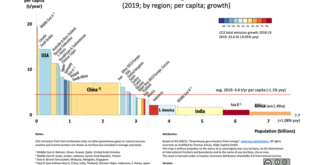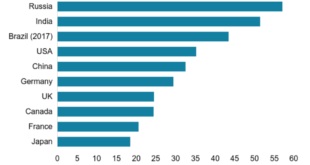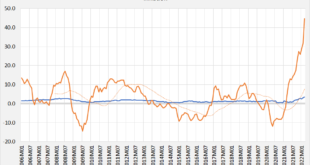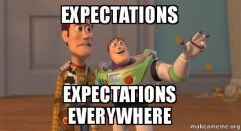from Lars Syll Although the expected utility theory is obviously both theoretically and descriptively inadequate, colleagues and microeconomics textbook writers all over the world gladly continue to use it, as though its deficiencies were unknown or unheard of. Daniel Kahneman writes — in Thinking, Fast and Slow — that expected utility theory is seriously flawed since it doesn’t take into consideration the basic fact that people’s choices are influenced by changes in their wealth. Where...
Read More »Per capita CO2 emissions by country
Ethical criteria which hold the sustainability of life at their core
from Fernando García-Quero and Fernando López Castellano and RWER current issue Overconfidence in the magical thinking of technification, economic growth, the free market, and neoliberal globalization has led many to forget that the state is the main policy architect and actor when facing a crisis. Successful responses to Covid-19 have shown, once again, the central role of states in organizing political measures that foster and maintain the welfare of their populations, through actions...
Read More »Countries where the 1% have the largest share of wealth
Consumer energy prices: stylized post 1960 facts
At this moment, retail energy prices (prices paid by consumers and companies for final use of energy) are, compared with other consumer prices, rising fast. Has this happened before? Yesterdays post shows that in the EU and since 2006 the rise is exceptional. But what shows when we look further back in time? For reasons of convenience and because the USA data stretch back to 1960 while the EU data only stretch back to 1997 I’ve tinkered a little with USA consumer price data. The answer...
Read More »The toll of high energy prices
Inflation is up. A remarkable aspect of todays inflation is the relatively high increase of energy prices (graph), an international phenomenon. Rising prices are a bitch when nominal incomes stay behind, which at the moment is the case in Europe. This leads especially to problems for people with lower incomes who have less money to spare and who spent a relatively larger amount of their income on energy. So, what to do? Should we raise interest rates? Hmmm…. The relation between...
Read More »The role of ideology in economicss
One of the purposes – if not the main one – of mimicking physics was to argue that economics is a value-free science as it is argued about the natural sciences. However, the truth is that every researcher starts her work expecting to arrive at some result. The critical issue is if, in the process of investigation, she is open to consider arriving at a different conclusion although it may contradict her own and her colleagues’ a priori beliefs. Any individual or social group has a...
Read More »Introducing maldevelopment indices
from Jorge Buzaglo and Leo Buzaglo Olofsgård and RWER current issue In recent years there has been a proliferation of alternatives to move beyond GDP as an indicator of socio-economic wellbeing. This was most probably due to the growing distrust of GDP as an appropriate metric for measuring the degree of advancement of societies. Another probable reason for the growing GDP disbelief is the ecological crisis rapidly approaching catastrophic levels, and the international opinion and mass...
Read More »Recession fears: real and imagined
from Dean Baker There is a story of a football coach who ran running plays near the end of a game, when he clearly should have been passing. Apparently, he had seen data showing that teams that win, on average, run on a certain number of plays. His team was below this number, so he decided that he had to have more runs if his team was going to win. This is a classic case of confusing correlation with causation. (For those not familiar with football, when a team is ahead, it generally uses...
Read More »Expected utility theory — nothing but an ex-hypothesis
from Lars Syll In mainstream theory, preferences are standardly expressed in the form of a utility function. But although the expected utility theory has been known for a long time to be both theoretically and descriptively inadequate, mainstream economists gladly continue to use it, as though its deficiencies were unknown or unheard of. What most of them try to do in face of the obvious theoretical and behavioral inadequacies of the expected utility theory, is to marginally mend it. But...
Read More » Real-World Economics Review
Real-World Economics Review







